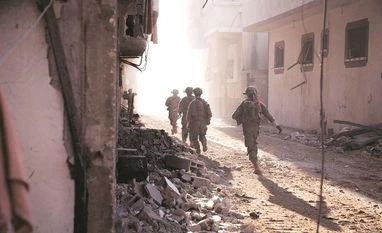The chief of Israel's Mossad intelligence service vowed on Wednesday that the agency would hunt down every Hamas member involved in the October 7 attack on Israel, no matter where they are. His pledge came a day after the deputy head of the Palestinian militant group was killed in a suspected Israeli strike in Beirut.
Israel has refused to comment on reports it carried out the killing, but the remarks by David Barnea appeared to be the strongest indication yet it was behind the blast. He made a comparison to the aftermath of the slayings at the Munich Olympics in 1972, when Mossad agents tracked down and killed Palestinian militants involved in killing Israeli athletes.
Israel was on high alert on Wednesday for an escalation with Lebanon's powerful Hezbollah militia after the strike in the Lebanese capital killed Saleh Arouri, the most senior Hamas member slain since the war in Gaza erupted nearly three months ago.
The strike in Hezbollah's southern Beirut stronghold could cause the low-intensity fighting along the Lebanon border to boil over into all-out war.
In a speech on Wednesday evening, Hezbollah leader Hassan Nasrallah promised revenge, repeating his group's statement that "this dangerous crime" of Arouri's killing will not go "without response and without punishment". But he left the audience guessing as to when and in what form.
Nasrallah said Hezbollah had so far been careful in its strategic calculus in the conflict, balancing "the need to support Gaza and to take into account Lebanese national interests". But if the Israelis launch a war on Lebanon, the group is ready for a "fight without limits".
More From This Section
"They will regret it," he said. "It will be very, very, very costly."
Arouri's killing provided a morale boost for Israelis still reeling from the October 7 attack as the militants continue to put up stiff resistance in Gaza and hold scores of hostages.
Barnea said the Mossad is "committed to settling accounts with the murderers who raided the Gaza envelope", referring to the area of southern Israel that Hamas attacked. He vowed to pursue everyone involved, "directly or indirectly", including "planners and envoys".
"It will take time, as it took time after the Munich massacre, but we will put our hands on them wherever they are," he said. Barnea was speaking at the funeral of former Mossad head Zvi Zamir, who died at age of 98 a day earlier.
Zamir headed the intelligence agency at the time of the Munich attack, in which Palestinian militants killed 11 members of the Israeli Olympic delegation. Israel subsequently killed members of the Black September militant group who carried out the attack.
Looking to Hezbollah
Hezbollah and the Israeli military have been exchanging fire almost daily over the Israeli-Lebanese border since the war in Gaza began. But Nasrallah has appeared reluctant to escalate it further, perhaps fearing a repeat of the monthlong 2006 war, when Israel heavily bombed Beirut and southern Lebanon.
At the same time, Hezbollah also faces pressure to show support for its ally Hamas.
Nasrallah's comments on balancing interests reflected the group's wariness of being blamed by Lebanese if its exchanges with Israel spiral into an all-out war that brings destruction similar to the 2006 war. He avoided specifics on any possible reprisal for Arouri's killing, though he said he would address the issue further in a speech on Friday.
But he said if Israel attacks Lebanon, it would be in the national interest to fight back. "We are not afraid of war," he said. "If the enemy thinks about launching a war against Lebanon, then we will fight back without ceilings and without limits."
Hezbollah boasts an arsenal of tens of thousands of rockets and missiles as well as different types of drones. The United States has sought to prevent any widening of the conflict, including by deploying two aircraft carriers and other military assets to the region. Secretary of State Antony Blinken was expected in the region this week.
Nasrallah praised Arouri as well as the group's October 7, attack, saying it "brought light back onto the Palestinian cause after it was nearly forgotten". He said Israel has so far failed in all its objectives in the Gaza war and was suffering damage to its international reputation.
The Israeli military chief of staff, Lieutenant Colonel Herzi Halevi, visited Israel's northern border with Lebanon on Wednesday, saying "We are on high readiness in the north."
Hamas leaders clearly expect Hezbollah to have its back.
In an interview on Saturday, three days before Arouri's killing, The Associated Press asked Beirut-based Hamas political official Osama Hamdan if the group was worried about the possibility of Israel assassinating its officials in Lebanon.
Hamdan predicted that Hezbollah would not let that go unpunished, and an all-out war would ensue.
"So why would Israel want to do that? Does it want a war" in Lebanon? he asked. "War can happen if Israel acts wrongly and aggressively," or war might not occur "if Israel takes a step back and acts in a way that is not aggressive against Lebanon".
Arouri was the deputy of Hamas' supreme political leader, Ismail Haniyeh, and headed the group's presence in the Israeli-occupied West Bank. He was also a key liaison with Hezbollah.
A US official confirmed that the Israeli military carried out the strike that killed Arouri and did not give the White House advance notice. The official spoke on the condition of anonymity because they were not authorised to discuss the operation.
)